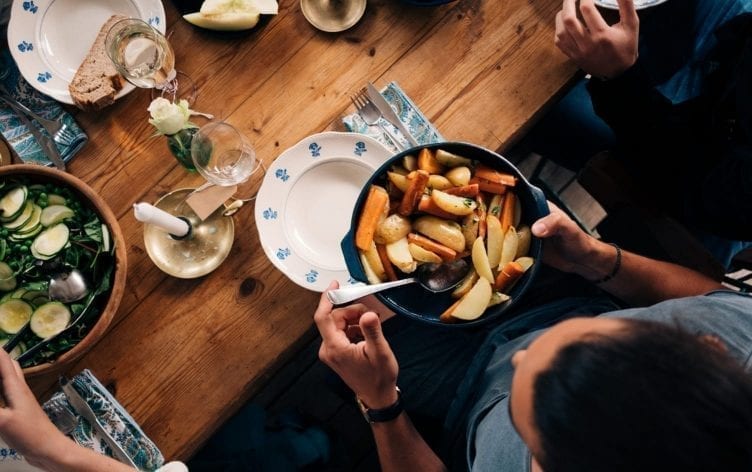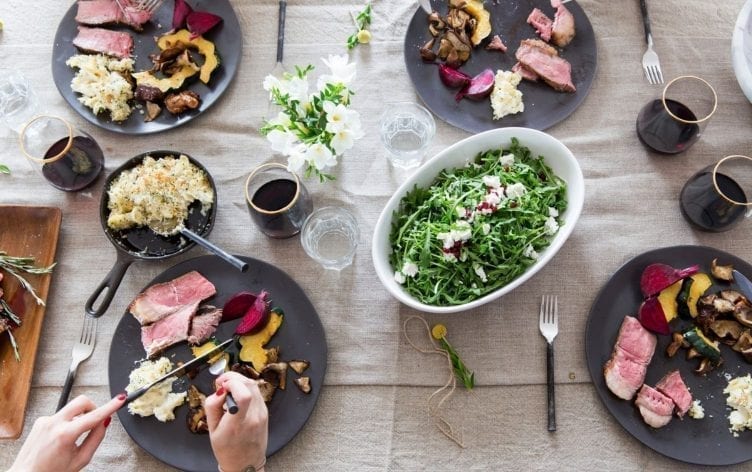Research published in the New England Journal of Medicine found participants started gaining weight in October and continued seeing incremental gains in their weight through the New Year. The actual weight gain was minimal — about 1.3 pounds — but it took five months to lose. In other words, eating that pumpkin pie now could affect whether your spring wardrobe fits.
Here, five surprising reasons it’s hard to avoid extra calories during the holidays and strategies for staying on track:
DINNERS ARE BIG SOCIAL EVENTS
Holiday season means gathering around the table to share a meal with numerous friends and family. Research presented at the American Heart Association meeting found the chance of a diet lapse was much higher when meals were consumed in social settings, where meal sizes increased up to 44%.
The fix: Before helping yourself to seconds (or thirds), take time to chat with your neighbor. This helps you slow down and recognize when you’re actually full. You can also employ these mindful eating strategies.
YOU DECLINE DESSERT
You might think passing on the cookies and cake helps keep the number on the scale from creeping up, but Atlanta-based registered dietician Marisa Moore believes it’s a mistake to turn down sweet treats. “Choosing a ‘healthy’ dessert when you really want a slice of your family’s old-fashioned pecan pie (made with regular sugar and crust) may leave you feeling unsatisfied and craving more dessert later,” she explains.
googletag.cmd.push(function() {
googletag.display(“ad-tag-300×250-post-m2”);
});
The fix: Go ahead and eat a slice of pie or cake — but not both — and savor every bite.
THERE ARE ENDLESS TOASTS
Although a 5-ounce glass of red wine is just 125 calories — and has been associated with a host of health benefits, including increasing HDL “good” cholesterol and reducing the risk of heart disease — raising a glass to celebrate the season could have an unintended ripple effect. Erin Palinski-Wade, RD, author of “Belly Fat Diet For Dummies” explains, “Being in a celebratory mood (and also the increased alcohol consumption that can occur during the holiday season) can lead to reduced inhibitions and a desire to eat more of the foods you tend to limit the rest of the year.”
The fix: Imbibe in moderation (one drink per day for women, two for men) and sip on a glass of water regularly so you stay hydrated.
THE PLATES AT THE BUFFET ARE HUGE
The size of the average dinner plate has increased 23% since 1900 and the larger the plate, the more likely you are to fill it. You’ll eat 30% fewer calories if you scoop holiday favorites onto a smaller plate, according to a study published in the Journal of the Association for Consumer Research. “We eat with our eyes just as much as we eat with our stomachs. If you look at a half-empty plate, you can feel less satisfied. By filling a small plate completely, you can trick yourself to thinking you are eating more and therefore feel more satisfied,” Palinski-Wade explains.
CLICK TO TWEET THIS ARTICLE > Having trouble maintaining your weight-loss plan this holiday season? Consider these five culprits via @MyFitnessPal. #WeightLoss
YOU PLAN TO STICK TO A DIET
Studies show it’s common to consume more than 3,000 calories during a typical holiday meal, but deciding to stick to a strict diet from Thanksgiving to the New Year is a mistake. “Any time you focus on a food by calling it out as something to avoid, you are making it seem more desirable,” Palinski-Wade says. “You give more thought to the off-limit foods that you would have otherwise, which can lead to feelings of deprivation — [and that can] lead to binge eating.”
The fix: You might actually benefit from taking a break from counting calories, according to a 2018 study that found taking a diet break helped dieters lose more weight. Go ahead and celebrate the season but exercise moderation. As Moore explains, “Having a choice to eat what you want whenever you’d like without cheat days or restriction fosters a healthier relationship with food with less guilt and fewer triggers to overeating.”
Originally published November 2018
Ready to take the next step? Unlock MyFitnessPal Premium to access custom goal settings, quick-log recipes, and guided plans from a registered dietitian. Premium users are 65% more likely to reach their weight loss goals!











